DESIGN PAPER 2 GRADE 12 QUESTIONS - NSC EXAMS PAST PAPERS AND MEMOS NOVEMBER 2018
Share via Whatsapp Join our WhatsApp Group Join our Telegram GroupDESIGN
PAPER 2
GRADE 12
NSC EXAMS
PAST PAPERS AND MEMOS NOVEMBER 2018
INSTRUCTIONS AND INFORMATION
- This question paper consists of TWO sections:
TOPIC 1: The examination sourcebook/workbook (50 marks)
TOPIC 2: The final practical examination product (50 marks)
TOTAL: 100 marks - The question paper has TWO briefs/themes. Choose ONE or COMBINE THE TWO OPTIONS.
QUESTIONS
BRIEF/THEME 1: PLANET EARTH 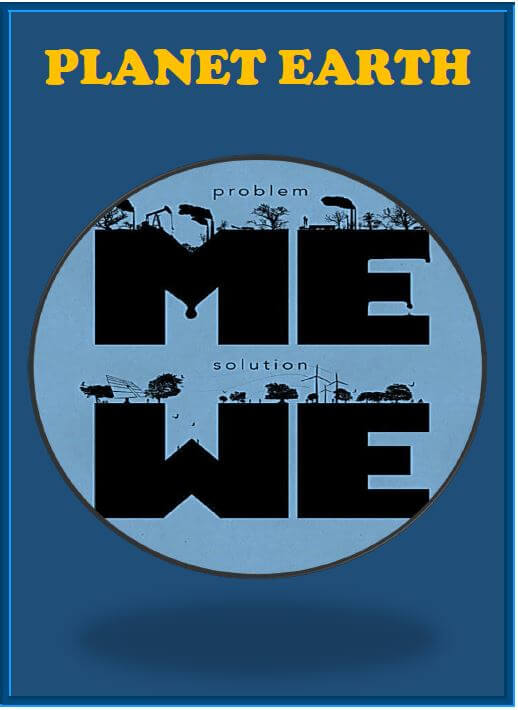
The one thing we all share is PLANET EARTH. – Wendell Berry
We are greeted by Mother Earth's unique and magnificent beauty every day. 
The planet Earth no longer appears as a mysterious and unexplored system. Over millions of years humanity has slowly exploited and plundered the planet of its natural resources. Much of our planet now suffers from a wide range of environmental issues. 
The rapid rate of change on the planet Earth is forcing us to take a new look at the world and our place within it. The millennials (children born in the early 2000s) of today yearn for a pre-industrial, pre-technological world.
Key issues need to be addressed urgently.
We need to help the next generation of scientists, biologists and designers to find solutions to the issues confronting our planet.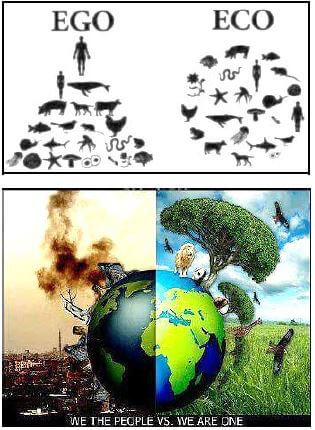
The illustrations above emphasise man in partnership with the planet rather than being in charge. Humankind should respect their place in this symbiotic, biodiverse ecosystem so that it remains habitable for future humanity.
Stephan Hawking, world-renowned theoretical physicist, believed the following:
Within the next thousand years or so, man will make the planet Earth uninhabitable and in a billion years from now the Earth will be a very hot, dry and uninhabitable planet. One way or another, our planet will likely become uninhabitable for mankind in the future. We need to start thinking seriously about how we will free ourselves from the constraints of this dying planet.
THE BRIEF/THEME:
Create an original environmental and/or social design solution based on PLANET EARTH that creates an awareness of the vulnerable beauty that surrounds us.
Use one or more of the design categories below for your design solution.
- VISUAL COMMUNICATION/INFORMATION DESIGN AND/OR DIGITAL DESIGN
Create awareness of our efforts to save/destroy the planet Earth. Use a billboard, poster, website design, brochure, sticker, book illustration, animation, packaging design, graffiti, etc. - SURFACE DESIGN AND TWO-DIMENSIONAL CRAFT DESIGN
Interpret the theme Planet Earth by focusing on inside and outside surfaces, such as upholstery, mosaic designs, wallpaper, carpets and wall finishes. Your design solutions should focus on creating an awareness of the vulnerable beauty that surrounds us. - PRODUCT DESIGN AND THREE-DIMENSIONAL CRAFT DESIGN
Products should be designed to inform people about sustainability and the use of environmentally friendly materials: lights, chairs, shelving, cushions, shoes, furniture, crockery, jewellery, clothing, etc. They can also be a celebration of the beauty of the Earth. - ENVIRONMENTAL DESIGN
To help the next generation of scientists and biologists restore the world, we need to reduce our carbon footprint and create designs that do not pollute or negatively affect the ecosystem or our health. For example, design an eco-friendly environmental model that deals with health: a hospital, a retreat; education: an eco-school; interactive museum and/or green architectural spaces: a green wall or turf-roof building, penthouse gardens, etc.
DO NOT copy the examples provided. 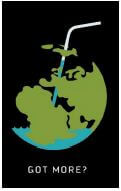
VISUAL COMMUNICATION/INFORMATION DESIGN AND/OR DIGITAL DESIGN 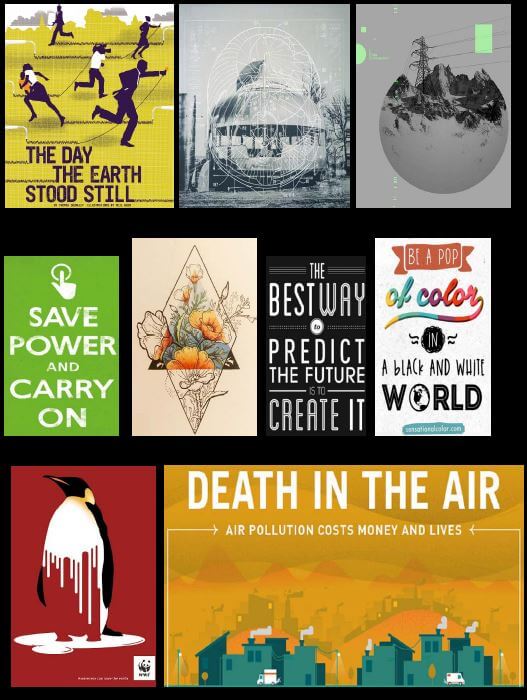
SURFACE DESIGN AND TWO-DIMENSIONAL CRAFT DESIGN 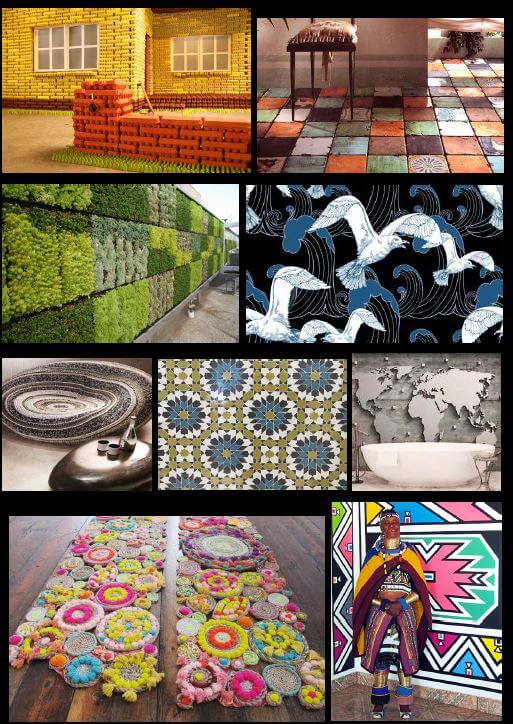
PRODUCT DESIGN AND THREE-DIMENSIONAL CRAFT DESIGN 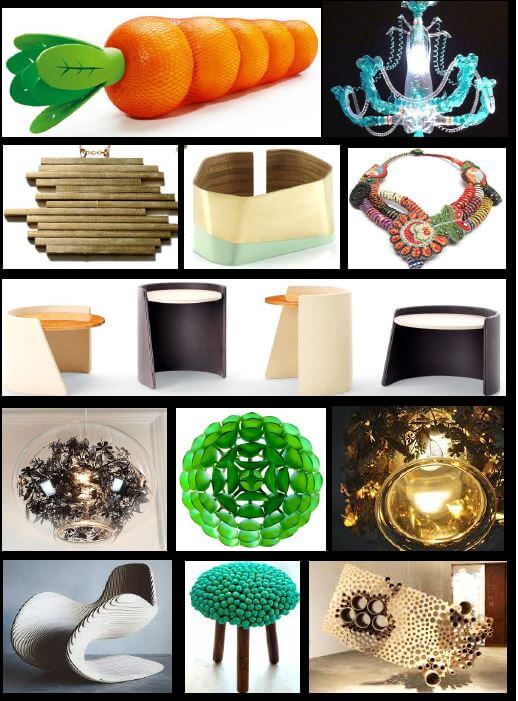
ENVIRONMENTAL DESIGN 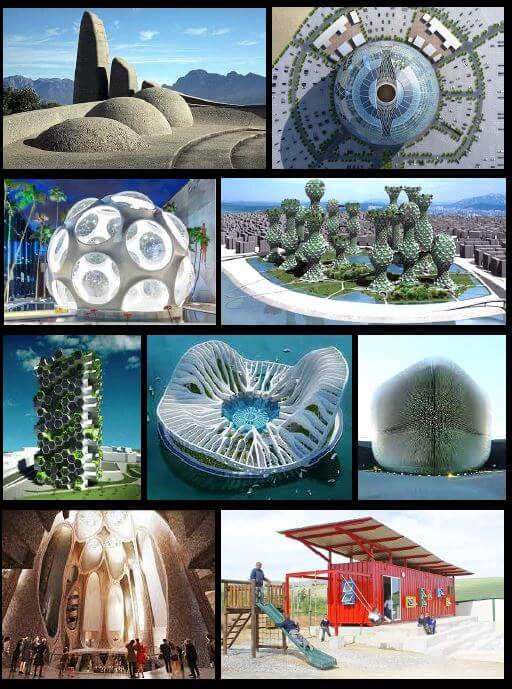
BRIEF/THEME 2: UNCONVENTIONAL DESIGN 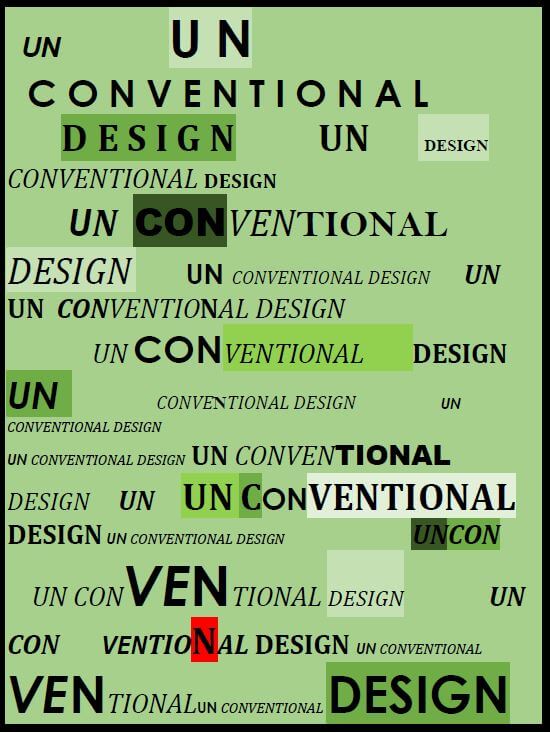
Restraints caused by the economic recession and environmental crisis have contributed to the rethinking of design, design products and processes. Perhaps now, at a time of deep economic anxiety and trouble, we should embrace UNCONVENTIONAL DESIGN trends as they bring life, creativity, entrepreneurship and beauty through the use of alternative, unconventional materials.
From a business perspective the use of unconventional, recyclable and upcycled materials and construction methods can produce possibilities to create and develop new, innovative, exciting design products and offer more entrepreneurial opportunities. 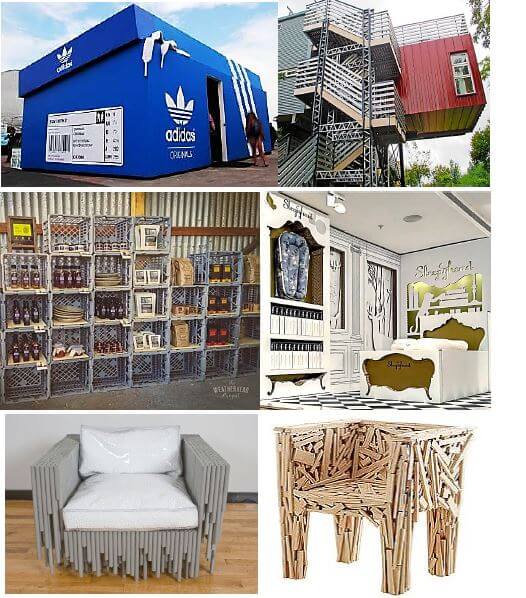
Unconventional design encourages recycling and upcycling, which are common creative solutions used in impoverished areas.
Note the innovative use of cardboard boxes, plastic crates, plastic and glass bottles, and wooden pallets in the images below. 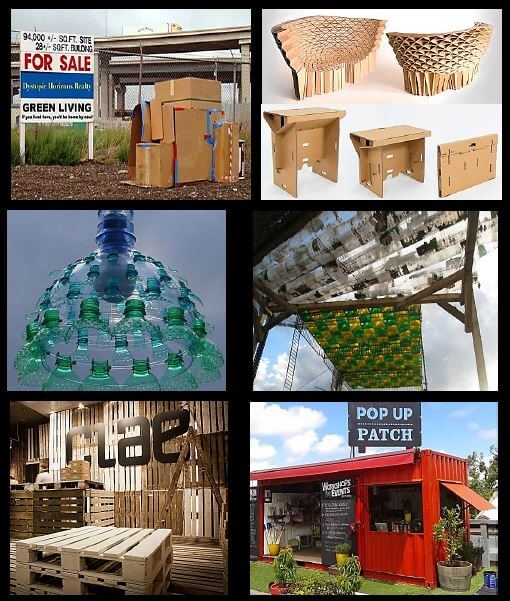
THE BRIEF/THEME:
Create a design in one or more of the design categories below that interpret the theme UNCONVENTIONAL DESIGN in an original and creative manner.
Use one or more of the design categories below for your design solution.
- VISUAL COMMUNICATION/INFORMATION DESIGN AND/OR DIGITAL DESIGN
The focus could be on the branding for an unconventional shop/business, e.g. a logo, letterhead, posters, website design, brochure and promotional items; unconventional or avant-garde ways of communicating a message through the use of original typography, innovative processes, materials and images in presenting creative design solutions. - SURFACE DESIGN AND TWO-DIMENSIONAL CRAFT DESIGN
You can choose to create wallpaper, textiles, mosaics, upholstery, curtaining and cladding of floors, ceilings and walls with unconventional materials or techniques. - PRODUCT DESIGN AND THREE-DIMENSIONAL CRAFT DESIGN
Design any unconventional product, e.g. unusual or eccentric cushions, lights, chairs, shelving, shoes, furniture, crockery, jewellery, lamps, clothing, handbags and accessories. Carefully consider your choice of materials. - ENVIRONMENTAL DESIGN
You may consider creating an actual pop-up shop or display space. Think about the use of natural and/or artificial light to highlight your exhibition space and products. Be innovative with the use of materials, consider the use of recycled and upcycled materials, such as cardboard, plastic, tin, wooden pallets and second hand shipping containers. Do not underestimate the creative possibilities of flat-packed cardboard boxes as building material. You can create a model for an unusual public space, e.g. a park, a piazza, an airport and waterfront.
DO NOT copy the examples provided.
VISUAL COMMUNICATION/INFORMATION DESIGN AND/OR DIGITAL DESIGN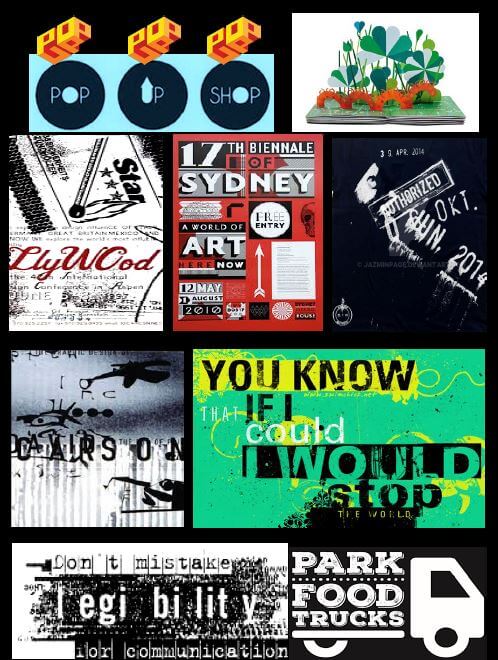
SURFACE DESIGN AND TWO-DIMENSIONAL CRAFT DESIGN 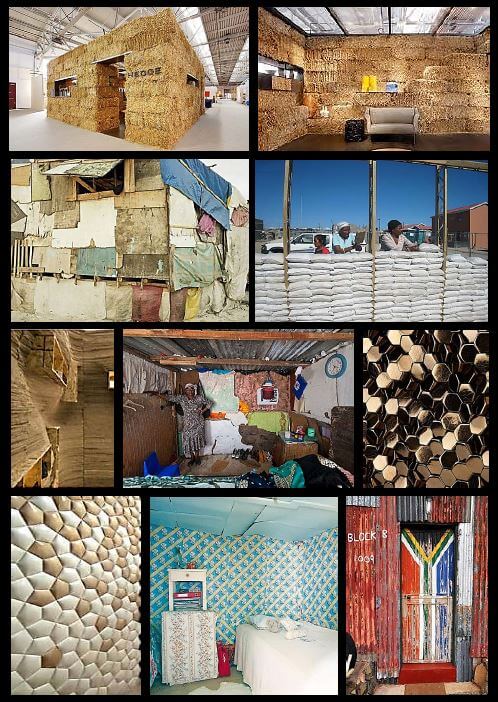
PRODUCT DESIGN AND THREE-DIMENSIONAL CRAFT DESIGN 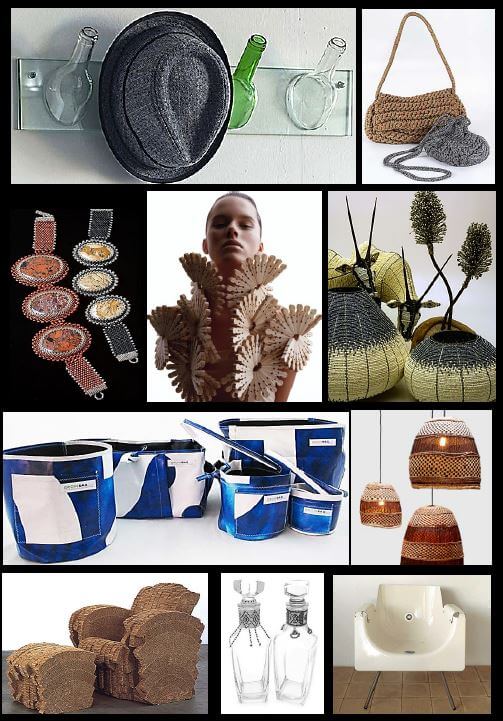
ENVIRONMENTAL DESIGN 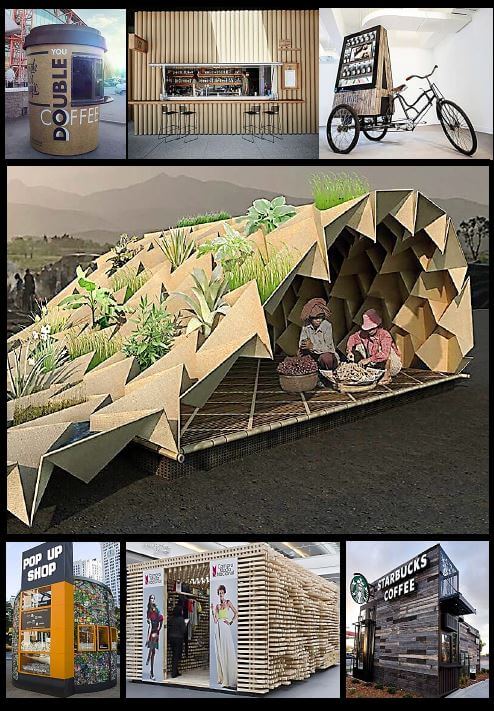
REQUIREMENTS
SECTION A
TOPIC 1: THE DESIGN PROCESS [50]
- All processIpreparatory work for your design must be shown in a sourcebook/workbook.
- This will involve the processes from conceptualisation to realisation.
- Thorough investigation of problems posed by the design brief should be shown.
- The sourcebook/workbook must be presented in the form of an album (that is in book form).
- It must open easily and have pages that turn easily.
- The sourcebook/workbook must be made of a light material to facilitate transport where work is moderated at a central venue.
- Ensure that the sourcebook/workbook is presented professionally.
NOTE:
- As TOPIC 1 (preparation) has the same mark allocation as TOPIC 2 (the final product), it should be given enough time to acknowledge its importance.
- Your teacher may be involved in this preliminary preparatory session only (TOPIC 1).
- ou may work at home.
CRITERIA FOR THE DESIGN PROCESS (TOPIC 1)
You should present the following (refer to the NSC Design Examination Guidelines):
- Expression of intention and rationale (10)
- Evidence of research, experimentation and reflection (10)
- Evidence of detailed planning and presentation related to the final concept (30) [50]
SECTION B
TOPIC 2: THE FINAL PRODUCT [50]
Although it is recommended that a two-dimensional design should NOT be larger than A2 in size, candidates' work is not restricted regarding size.
The size of a three-dimensional design will depend on the function of the object being made. Take into account that the final product might have to be transported to a central marking venue.
NOTE:
- Your teacher may NOT assist you in any way during the final production of the design.
- ALL work must be done under the teacher's and the appointed invigilator's supervision at your school.
- Any form of direct copying/plagiarism or work that is not your original work will be strictly penalised.
- A declaration of authenticity (ADDENDUM A) must be completed by yourself, the chief invigilator and the teacher.
- Work must be done on a continuous basis, e.g. on three consecutive days under controlled circumstances.
CRITERIA FOR THE DESIGN PRODUCT (TOPIC 2)
You should use the following criteria (refer to the NSC Design Examination Guidelines):
- Creativity/Originality/Interpretation in terms of the concept and solutions that are relevant to the brief (10)
- Evidence of design involvement: the appropriate use of design elements and principles (10)
- Technique/Craftsmanship/Method (10)
- The design solution with evidence of at least 12 hours', but not more than 24 hours' work under controlled circumstances (10)
- Professional presentation and functionality of the design solution (10) [50]
TOTAL: TOPIC 1 (50) + TOPIC 2 (50) : 100
INSTRUCTIONS TO THE TEACHER
PRACTICAL EXAMINATION TOPIC 1 (50 MARKS) AND TOPIC 2 (50 MARKS) – TASK 7
- This practical examination consists of ONE question paper. This question paper comprises TWO parts: TOPIC 1 (the examination sourcebookIworkbook and TOPIC 2 (the final practical examination product).
- This practical question paper should be given to the candidates on Friday 20 July 2018. The final submission date will be Friday 19 October 2018.
- TOPIC 1 (design process) has the same weighting as TOPIC 2 (the final product) and it should therefore be given enough time to acknowledge its importance.
- Consequently, candidates should have enough time to do their TOPIC 1 (design process). The teacher may only be involved in this preliminary preparatory session and NOT in TOPIC 2. Due to the preparatory nature of TOPIC 1, candidates are allowed to work at home.
- Candidates must use the TOPIC 1 sourcebookIworkbook as a point of reference during their TOPIC 2 examination. Both TOPIC 1 and TOPIC 2 examination work must be submitted to the teacher/invigilator immediately after the TOPIC 2 examination has been completed.
- The teacher may NOT assist the candidate in any way during the final production of the design product (TOPIC 2).
- Any form of direct copying/plagiarism or work that is not the candidate's original work will be strictly penalised.
- TOPIC 2 must be done on a continuous basis during contact time, e.g. on three consecutive days under controlled circumstances.
- TOPIC 2 must be done at the candidate's examination centre, under the supervision of the teacher/invigilator. TOPIC 2 work may NOT be done at home.
- TOPIC 2 work must NOT be removed from the examination centre under any circumstances.
- Each province will determine the marking process of TOPIC 1 (sourcebookI workbook) and TOPIC 2 (final product). Schools will be notified by the provinces regarding the date, time and venue for the submission of work to the examination centres, where applicable.
- The examination TOPIC 1 should be professionally presented in a sourcebookIworkbook in album format.
- The sourcebook/workbook and final product must be labelled neatly and clearly.
- ADDENDUM A must be completed in full and the school stamp should appear in the appropriate space. Attach ADDENDUM A securely to the final examination work (sourcebook/workbook and/or final product).
ASSESSMENT GUIDELINES
OUTCOMES | REQUIREMENTS | WEIGHTING % | MARKS | |
SOURCEBOOK/WORKBOOK | TOPIC 1 The candidate is able to understand the design process from conceptualisation to realisation. | Expression of intention and rationale | 10 | 50 |
Evidence of research, experimentation and reflection | 10 | |||
Evidence of detailed planning and presentation related to the final concept | 30 | |||
THE FINAL PRODUCT | TOPIC 2 The candidate is able to produce and present a body of work in the chosen discipline(s) which shows an understanding of design skills and production processes. | Creativity/Originality/Interpretation in terms of the concept and solutions that are relevant to the brief | 10 | 50 |
Evidence of design involvement: the appropriate use of design elements and principles | 10 | |||
Technique/Craftsmanship/Method | 10 | |||
The design solution with evidence of at least 12 hours', but not more than 24 hours' work under controlled circumstances | 10 | |||
Professional presentation and functionality of the design solution | 10 | |||
TOTAL | 100 |
NOTE: Teachers and markers must refer to the NSC Design Examination Guidelines and the PAT Guidelines for detailed assessment criteria.
ADDENDUM A
This addendum must be detached, copied, completed, signed and attached to the final examination work (workbook/sourcebook and/or final product).
NOVEMBER 2018 SOURCEBOOK/WORKBOOK
1. | Name of subject | DESIGN |
2. | Code of subject | DSGN |
DECLARATION OF AUTHENTICITY | ||||||||||||||||||
Centre number | ||||||||||||||||||
Examination number | ||||||||||||||||||
District/Circuit | ||||||||||||||||||
Signature and date | School stamp | |||||||||||||||||
Candidate | ||||||||||||||||||
Principal | ||||||||||||||||||
Chief Invigilator/Teacher | ||||||||||||||||||
NOVEMBER 2018 FINAL PRODUCT
1. | Name of subject | DESIGN |
2. | Code of subject | DSGN |
DECLARATION OF AUTHENTICITY | ||||||||||||||||||
Centre number | ||||||||||||||||||
Examination number | ||||||||||||||||||
District/Circuit | ||||||||||||||||||
Signature and date | School stamp | |||||||||||||||||
Candidate | ||||||||||||||||||
Principal | ||||||||||||||||||
Chief Invigilator/Teacher | ||||||||||||||||||